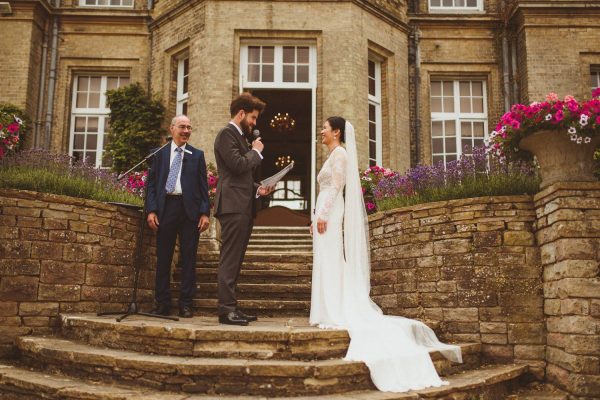
by Michael | Mar 28, 2023 | Blog
Well, of course, you need to define what you consider luxury.
Cons
There aren’t really too many cons, in truth. The bottom line is that you can have a ceremony without a celebrant. If it’s a wedding, you can go down the Church or Register Office routes. They cover everything.
If a ceremony doesn’t need official documentation, technically anybody can conduct the ceremony. So you can ask a friend or relative to do so.
Therefore, technically, using a celebrant is indeed a luxury.
Pros
To despatch the second objection first, if you’re not using a professional celebrant, you may not get the ceremony you are hoping for. It may be difficult to design a suitable service without the guidance and ideas of a celebrant. Moreover, a celebrant knows how to present in public, and will do a lovely job. They will enhance the ceremony.
The first objection is a matter of choice.
You can opt for a religious ceremony (Church). You get the standard service and you know what you’re getting. It won’t be personalised, but that’s fine for some people.
The Register Office service is also standardised. It won’t really be personalised and, in contrast to the religious ceremony, it will be totally secular. You can’t mention God at all, for example. Most Registrars haven’t been trained to present with panache, so the service, which lasts about a quarter of an hour, is rarely particularly special. However, some couples are content with this.
Of course, until such time as the law changes (which should happen this summer), you need to use one of the two above options to comply with the law.
So, in that respect, using a civil celebrant would almost be duplication.
However, the professional services of a celebrant normally include the following:
- The chance to discuss your vision of your ceremony and build a unique service
- Advice and ideas based on (possibly) years of experience
- Respect for your input
- Numerous conversations/emails and drafts to get the order of service just right
- Help with the choreography of a big event
- A trained public speaker
- Professional pride and passion
One of my USPs is that I offer knowledge of languages (French, German, Russian, ability to read Hebrew and Czech), which has proved useful and popular.
Costs
Some celebrants’ package will cost over £1,000. Some will ask half that. (As I write, I’m somewhere in between.)
I would love the chance to make a real difference to your special day.Do contact me for a non-obligation chat.
People who use me are convinced that I am not a luxury!
Evidence
Let me finish with a quote from just one of my happy couples:
“From our first meeting with Michael we came away feeling very confident we would like to use him for our ceremony. His calming yet assertive demeanour put us at ease and we knew he would blend and adapt to what we had planned very well. Michael injected some fantastic ideas along with some beautiful readings and on the day there wasn’t a dry eye in the room. The whole process was very fluid and professional but always with a smile. We couldn’t recommend him enough.”
photo: Matt Penberthy
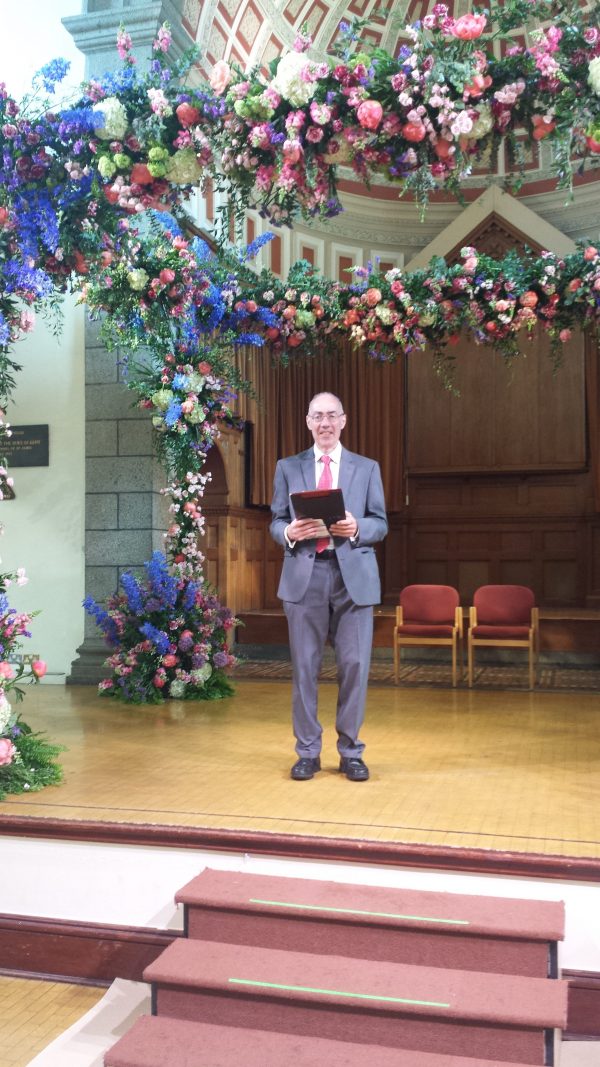
by Michael | Mar 5, 2020 | Blog
A common question I hear is “who can actually conduct a wedding?”. People are understandably confused. Most think that it has to be a priest (or equivalent) or else the registrars. But those are not the only options.
As we’ll find out, there’s also the civil celebrant who can do the job.
Religious
Obviously, if it’s a full religious wedding, you’d expect it to be handled through the church (or institution), and that should be that. However, this applies (and I’m only talking about England & Wales) for a Church of England service – or Quaker or Jewish. Otherwise, although you are welcome to celebrate a Catholic wedding (say), you will still need to make an appointment (with two witnesses) to go to the Register Office and get legally married there. Without the registrars’ participation and the pronouncing of certain words, you would not qualify as legally wed.
Civil
The registrars offer a service that is totally non-religious. The content varies somewhat from district to district, but the fact that services are completely secular is a constant. Unless you are having a C of E service (or Quaker or Jewish), you will need to call upon the registrars.
There is one
element of choice here, though. You can go down (as already stated) to the
Register Office, and it will cost in the region of £100 for the ceremony.
However, provided certain stipulations are met – notably, four solid walls and
a roof – the registrars will come out to the venue of your choice. This will
probably cost around £600, though.
Celebrant
There is
another option, however, which all too few people know about.
- What
if you don’t want a full religious service?
- What
if you do want it, but are prevented from marrying in your church/synagogue
etc. because (Catholic) you are a divorcee or perhaps because yours is a
mixed-faith ceremony?
- What
if you (or even your parents!) want to have just a little religion in your
service?
Well! Provided that you don’t opt for a humanist celebrant, you can enjoy a personalised ceremony with as much religion as you want.
You still
have to get legally married (as before, by the registrars), but you can then
have the ceremony of your dreams, compiled and conducted by a civil celebrant.
It can be in the venue of your dreams, and, to all intents and purposes, be
your actual wedding. It can reflect your
personalities and beliefs, with inspiring spiritual – or even funny – readings,
and contain personalised sections, such as self-written vows.
So don’t go
thinking that your big day doesn’t have to be the way you want it! Because it
can!
Have a chat
with me, and I’ll show you how.
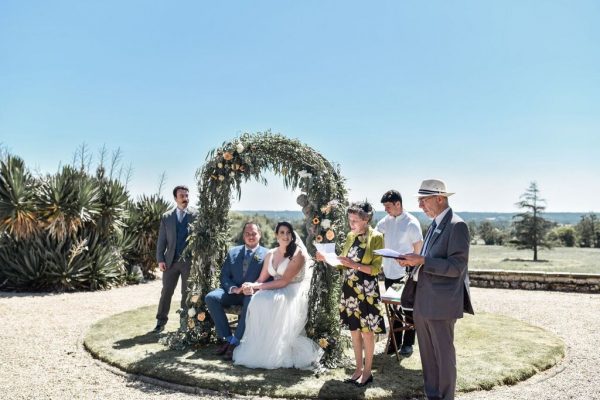
by Michael | Oct 7, 2019 | Blog
Among the questions I am regularly asked are the following:
What is a Civil Celebrant, actually?
The bottom line is that a civil celebrant will personalise your ceremony for you. They should be able to advise you, but will also listen to you. Their goal is to understand your vision of the big day, and tailor a ceremony that reflects your personalities and beliefs and is everything you ever dreamt it would be.
What sort of Ceremonies does a
celebrant offer?
Some specialise in one or two areas only (eg high-end weddings or funerals). However, most will offer weddings, vow renewals, namings, handfastings, funerals, and so on. These may be religious, part-religious or secular, depending on the celebrant.
Why not have a full religious
ceremony?
There’s nothing to stop you having a full religious ceremony led by a celebrant. You’re more likely to go to your own Church (or whatever) for this, though. Moreover, many celebrants are not ordained; however, they may still be willing and able to perform such a ceremony.
Are civil celebrant ceremonies legal?
This is now
under discussion at Parliament. But, at least, for the next few years celebrant
ceremonies in England & Wales have no legal validity. That applies to weddings
or funerals, as these must be legally registered.
There is nothing to stop you getting legally married at a Register Office (by appointment) with two witnesses. You can then proceed – that day or the next – to the venue of your choosing to have the celebrant-led ceremony of your choice. Which, to all intents and purposes, will be your actual wedding.
What makes a celebrant-led ceremony
special?
The celebrant crafts the ceremony together with you. Usually, you will be sent drafts to comment on, and a good celebrant will ensure that you have approved every word of the ceremony by the time the big day arrives.
You may be
encouraged to incorporate rituals (such as handfasting, Unity Candle, stamping
a glass underfoot, etc.) and personal items (how you met, what attracts you to
each other etc.).
You can
include the readings you like (whether spiritual, religious, humorous, or
whatever) and have the people you want participating in the ceremony.
You might write
and recite your vows (possibly, with the celebrant’s assistance).
You work as
a team towards your special, unique ceremony.
How do you choose a really good
celebrant and how much do they charge?
If you don’t have first-hand experience or a reliable recommendation, have a look at the celebrant’s website.
Look at testimonials.
See what the celebrant says and how they say it.
Do you think you will like them? Do you feel you can trust them?
Are they humble enough to listen to you? Will they be competent on the day?
If you think
they are promising, speak to them, preferably face-to-face, and ask the burning
questions you may have. (You can meet a couple of celebrants, and see how they
match up.)
Once you
have decided you want that particular celebrant to share the limelight with
you, only then worry about their cost.
You might find one who undercuts the others considerably, but do you want to take the risk of being disappointed on the day? Nonetheless, it should be pointed out that being expensive does not guarantee quality.
If the celebrant you do want to work with is a little too expensive, can you save some money somewhere else? Or can you pay in instalments?
Of course, you may have other questions; I’m waiting to answer them!
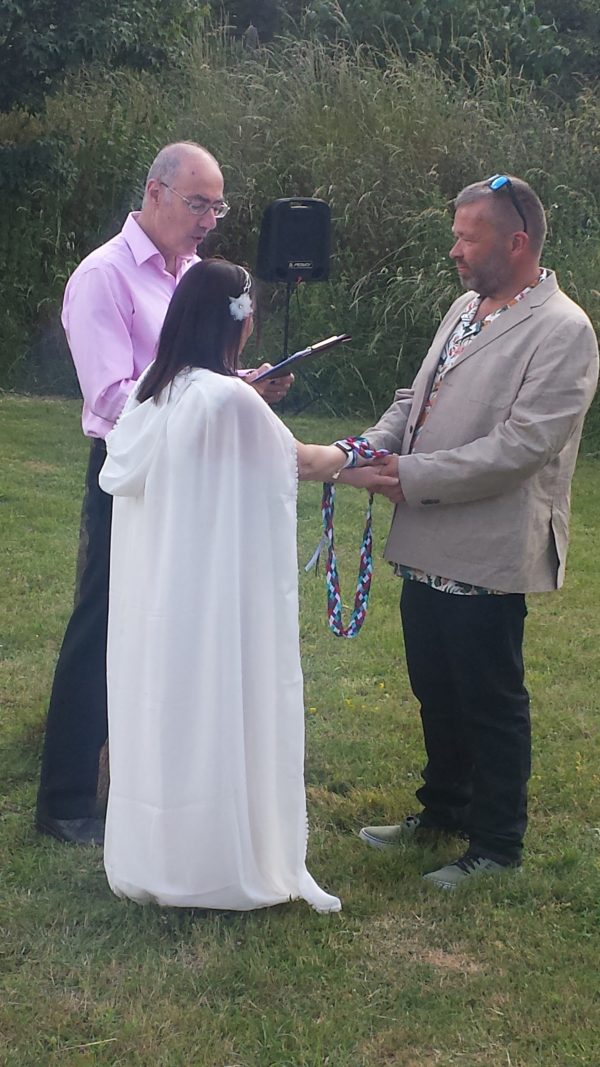
by Michael | Jan 28, 2019 | Blog
In my role as a civil celebrant, I meet a lot of people who have been fed myths about marriage options . My goal is to bust at least a few of them!
Myth no. 1
“You can
only marry in a church (or equivalent) or a register office.”
There are
actually three ways you can marry.
Firstly, through your church or synagogue etc. You will have a full religious ceremony, which will include the legal bits. There isn’t much opportunity for personalising the ceremony, though.
Secondly, through your Register Office. This ceremony will not include any religious references, let alone the name of God. Like the religious ceremony, it will not be very personal to you (if at all).
The Registrars will come out to a chosen venue, if you want – but this comes at quite a financial cost!
The third option is to use a civil celebrant. This ceremony can be totally unique to you, but it will not be legal. Usually, couples get legally married by the Registrar and then move on to have the ceremony of their dreams in front of their chosen guests, which the celebrant writes and conducts.
Myth no. 2
“You have to
marry in church or at the Register Office.”
Although
these options are of course available, as I have suggested above, these are not
the only possibilities. You can marry where you like (subject to payment,
permission or agreement!).
At present, the registrars will come out and conduct their ceremony anywhere, so long as there are four solid walls. (They charge quite a bit for this, as I have indicated.) Legislation may change to allow them to perform marriages in the open air too, but this is as yet uncertain.
At present, a civil celebrant can conduct a service anywhere, indoors or outdoors. The venue can vary considerably: I have officiated at the Savoy, Stonehenge, on an exposed hilltop with fabulous views, at a canal-side sanctuary, in a (glorious) back garden – and the list goes on! You are limited only by your imagination.
Myth No. 3
“You need to
take out a mortgage just to afford a wedding.”
Depending on the budget you have in mind, this may indeed not be a myth! However, as I suggest in a number of my blogs, there are ways to save money – eg https://vowsthatwow.co.uk/marriage-costs/
Obvious ways include reducing the guest list and choosing a modest venue. You can also save money by marrying out of season and even in the afternoon and midweek. Please glance through some of my suggestions.
A lot of people want to be married by a celebrant. They know they can’t dispense with the legal ceremony, and then realise they have to pay the Registrars and the Celebrant too. There is a way round this.
Go (by appointment) to the Register Office before the appointed wedding day (hours or even days before). Go with two witnesses, and you will be legally married. This will cost much less than paying the Registrars to come to your venue. The savings you make can go on hiring a celebrant for your tailor-made ceremony!
So you actually
have a lot more choice than you may have realised!
I hope this has been useful in pointing out what may not be obvious. If you have any enquiries, then do contact me. If you know of any other myths that need clarification, let me know and I’ll be glad not to have to think up another subject for a blog!
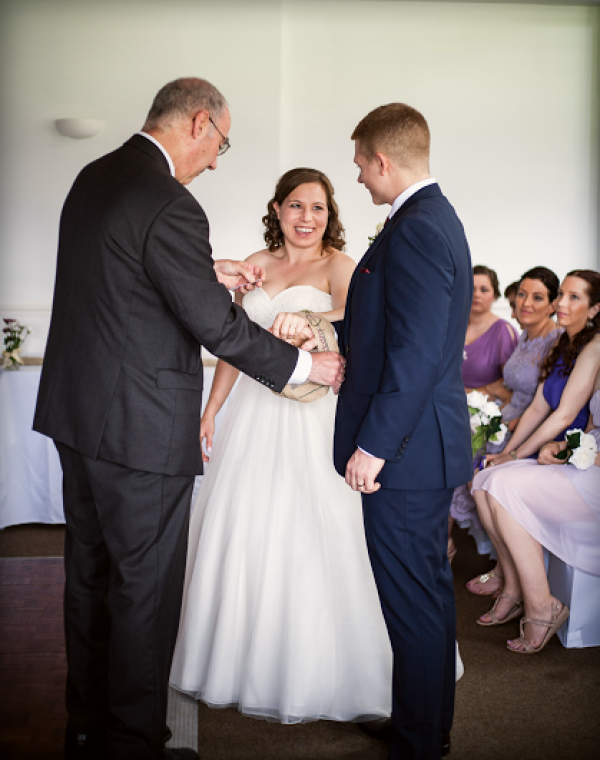
by Michael | Apr 16, 2018 | Blog
One of the beautiful things about organising a wedding together with a celebrant is that your ‘script’ can be exactly what you want. And, although there are some lovely vows you can borrow or adapt, writing your own wedding vows can prove to be personal, moving and affecting.
Guidelines
No one wants to risk producing ‘naff’ vows, so here are some tips to help you.
- Make sure you and your partner BOTH want to do this, and agree whether you will do this separately or together.
- Make sure that the person conducting the ceremony knows in advance. And it’s OK for them to look at what you have written before the ceremony.
- Allow loads of time to do this – you’re bound to need to do plenty of rewriting.
- Start by deciding a few general things you want to say (you can worry about the detail later) – just have clear in your head what it is important.
- What sort of register or tone do you want to use? By that I mean: will it be serious, humorous, deep, spiritual, religious, or some sort of combination?
- Decide on your content (more to follow).
- Once you’ve got a few sentences down (and remember, sixty seconds each is quite long enough!), see about reworking them so they look and sound good to you.
- Leave your draft a day or two, and come back and, if necessary, rework it. Get a friend to review it brutally!
- Once you’re satisfied, practise reading the vows (alone!) in front of a mirror – or practise with your partner.
- At the end of the ceremony, give the vows to somebody to keep for you (or make and file a copy beforehand).
What is the point of Vows?
Marriage vows:
- unite the couple legally
- are a public declaration of the couple’s love for each other (before God, if the ceremony is religious)
- are a public declaration of the couple’s commitment to each other
Do vows have to be religious?
In secular marriages, wedding vows can take any format – there is nothing to stop the couple from writing their own. Indeed, most celebrants would encourage that. The vows can be inspired by poetry, music or even films. They usually state each other’s expectations of marriage as well as declaring mutual commitment.
Religious marriage vows
Each religion has its own prescribed vows. (Any alterations would have to be discussed first with the officiant.)
Christian wedding vows may well include the familiar: “Do you, …., take … to be your wife/husband? Do you promise to love, honour, cherish and protect her/him, forsaking all others and holding only unto her/him?”
In Muslim weddings, it is usually the cleric who declares what the couple accept to do, but an example of a vow read out by the couple is as follows:
Bride: I, …, offer you myself in marriage and in accordance with the instructions of the Holy Koran and the Holy Prophet, peace and blessing be upon him. I pledge, in honesty and with sincerity, to be for you an obedient and faithful wife.
Groom: I pledge in honesty and sincerity, to be for you a faithful and helpful husband.
Hindu marriage ceremonies have seven steps of marriage which represent seven vows/promises that the couple make to each other in a wedding ceremony full of ritual.
Writing Your Own Wedding Vows
I often give practical help to my clients who choose the personalised approach. Apart from recommending brevity, I would suggest that you aim for (up to) five things you promise to do and (up to) five that you declare you will not do.
Sincerity and openness are ideal, but there can also be room for some humour. Some humour, please note!
Again, this is something I can help you with, if you wish. Just ask!
Photo: leerushby.com





